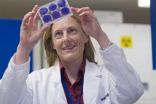(Press-News.org) AURORA, Colo. (Jan. 4, 2011) - Researchers at the University of Colorado School of Medicine have created a new and exciting mouse model to study how lipid sensing and metabolism in the brain relate to the regulation of energy balance and body weight. The research team, led by Hong Wang, PhD, created mice with a deficiency of lipoprotein lipase (LPL) in neurons, and observed two important reactions. First, the mouse models ate more and second, they became sedentary. Because LPL is important to the delivery of fatty acids to the brain, these responses spotlight the importance of fatty acid delivery to the brain in the regulation of body weight.
"This work may have important impact in understanding the causes of obesity and providing new treatments for this epidemic of our time," said Robert H. Eckel, MD, corresponding and senior author of "Deficiency of Lipoprotein Lipase in Neurons Modifies the Regulation of Energy Balance and Leads to Obesity" which was published today in Cell Metabolism.
The genetically-modified mouse (NEXLPL) has a defect in the breakdown of dietary lipoprotein triglycerides into fatty acids in the brain. These mice became obese on a standard chow diet between three and six months. At that point, the mice ate less and were less active.
The research also looked at which areas of the brain have the greatest impact on regulating body weight and learned that the hypothalamus may be the key area to observe as NEXLPL mice have increases in hypothalamic AgRP/NPY gene expression before obesity. AgRP/NPY cause increases in food intake and decreases in energy expenditure. Researchers also noted that the NEXLPL mice demonstrate deficiencies in n-3 fatty acids in the hypothalamus. Overall, this research indicates that the lipoproteins are sensed in the brain by an LPL-dependent pathway and provide lipid signals for the central regulation of body weight and energy balance.
INFORMATION:
The research team included scientists in the Division of Endocrinology, Metabolism and Diabetes in the Department of Medicine at the CU School of Medicine; the Department of Pharmacology at the University of California Irvine; the Department of Neurogenetics at the Max-Planck-Institute of Experimental Medicine in Germany; the Italian Institute of Technology in Genoa, Italy and the Department of Medicine at Columbia University in New York.
Faculty at the University of Colorado's School of Medicine work to advance science and improve care. These faculty members include physicians, educators and scientists at University of Colorado Hospital, The Children's Hospital, Denver Health, National Jewish Health, and the Denver Veterans Affairs Medical Center. Degrees offered by the University of Colorado School of Medicine include doctor of medicine, doctor of physical therapy, and masters of physician assistant studies. The School is located on the University of Colorado's Anschutz Medical Campus, one of four campuses in the University of Colorado system. For additional news and information, please visit the UC Denver newsroom online.
Research on obesity targets the brain's use of fatty acids
2011-01-06
ELSE PRESS RELEASES FROM THIS DATE:
Team creates novel vaccine that produces strong immunity against cocaine high
2011-01-06
LA JOLLA, CA – January 4, 2011 — Researchers from The Scripps Research Institute, Weill Cornell Medical College, and Cornell University have produced a long-lasting anti-cocaine immunity in mice by giving them a unique vaccine that combines bits of the common cold virus with a particle that mimics cocaine.
In their study, published January 4, 2011, in the advanced online edition of Molecular Therapy, the researchers say this novel strategy might be the first to offer cocaine addicts a fairly simple way to break and reverse their habit. The approach could also be useful ...
Detecting esophageal cancer with light
2011-01-06
DURHAM, N.C. – A tiny light source and sensors at the end of an endoscope may provide a more accurate way to identify pre-cancerous cells in the lining of the esophagus.
Developed by biomedical engineers at Duke University and successfully tested on patients during a clinical trial at the University of North Carolina at Chapel Hill, the device holds the promise of being a less invasive method for testing patients suspected of having Barrett's esophagus, a change in the lining of the esophagus due to acid reflux. Acid reflux occurs when stomach acid splashes, or refluxes, ...
University of Illinois research makes plant breeding easier
2011-01-06
University of Illinois research has resulted in the development of a novel and widely applicable molecular tool that can serve as a road map for making plant breeding easier to understand. Researchers developed a unified nomenclature for male fertility restorer (RF) proteins in higher plants that can make rapid advancements in plant breeding.
"Understanding the mechanism by which RF genes suppress the male sterile phenotype and restore fertility to plants is critical for continued improvements in hybrid technology," said Manfredo J. Seufferheld, U of I assistant professor ...
Metabolic cost of human sleep deprivation quantified by University of Colorado team
2011-01-06
In the first-ever quantification of energy expended by humans during sleep, a University of Colorado team has found that the metabolic cost of an adult missing one night of sleep is the equivalent of walking slightly less than two miles.
The new findings will help researchers further understand one of the important functions of sleep in humans, said CU-Boulder Associate Professor Kenneth Wright. Wright, who led the study, said the goal was to measure and quantify energy expenditure during both sleep and wakeful periods.
"We found that people do expend more energy when ...
From dusty punch cards, new insights into link between cholesterol and heart disease
2011-01-06
A stack of punch cards from a landmark study published in 1966, and the legwork to track down the study's participants years later, has yielded the longest analysis of the effects of lipoproteins on coronary heart disease.
The study, published in a recent issue of the journal Atherosclerosis, tracked almost 1,900 people over a 29-year period, which is nearly three times longer than other studies that examine the link between different sizes of high-density lipoprotein particles and heart disease.
It found that an increase in larger high-density lipoprotein particles ...
Viral evasion gene reveals new targets for eliminating chronic infections
2011-01-06
Walter and Eliza Hall Institute researchers in Melbourne, Australia, have discovered how a key viral gene helps viruses evade early detection by the immune system. Their finding is providing new insights into how viruses are able to establish chronic infections, leading scientists to reevaluate their approaches to viral vaccine development.
Researchers from the institute's Immunology division together with collaborators at the University of Cambridge (UK) have been studying how the immune system responds to viruses that cause persistent or chronic infections and why ...
Women with MS more likely to have MS-related gene than men
2011-01-06
ST. PAUL, Minn. –Women who have multiple sclerosis (MS) are more likely to have a gene associated with multiple sclerosis than men with the disease and it is this gene region where environment interacts with the genetics, according to a study published in the January 5, 2011, online issue of Neurology®, the medical journal of the American Academy of Neurology.
Research has shown that the number of people diagnosed with MS has been rising, and the rate has been rising faster for women than for men.
The cause of MS is not known, but evidence suggests that it is triggered ...
Rifaximin provides significant relief of irritable bowel syndrome symptoms
2011-01-06
CHAPEL HILL, N.C. – A pair of clinical trials, conducted in part at the University of North Carolina at Chapel Hill, found that two weeks of treatment with rifaximin provides significant relief of irritable bowel syndrome symptoms including bloating, abdominal pain and loose or watery stools.
In addition, the studies found that the benefits of treatment with rifaximin (brand name: Xifaxan) persisted for 10 weeks after patients stopped taking the broad-spectrum antibiotic, said Yehuda Ringel, MD, an associate professor of medicine in the UNC School of Medicine and a co-author ...
Research led by Cedars-Sinai shows antibiotic treatment effective in treating common G.I. disorder
2011-01-06
LOS ANGELES (EMBARGOED UNTIL 5 PM ET on JAN. 5, 2011) – A ground-breaking antibiotic therapy developed at Cedars-Sinai Medical Center is the first potential drug treatment to provide irritable bowel syndrome patients with long-lasting relief of their symptoms even after they stop taking the medication, according to a study published in the Jan. 6 issue of the New England Journal of Medicine.
Unlike in traditional therapies, such as when taking antidepressant and other medications that have benefits only while on the drug, patients in the study reported relief of their ...
Identity parade clears cosmic collisions of the suspicion of promoting black hole growth
2011-01-06
10-Dec 2010 What happens when galaxies crash together? For years, these cosmic collisions have been blamed for triggering violent outbursts at the hearts of galaxies. Now, a remarkable piece of detective work has given a verdict: galactic mergers do not usually whet the appetite of the black holes that power these active galactic nuclei, meaning other, less dramatic phenomena are responsible.
Most galaxies, including our own, have a huge but well-behaved black hole at their heart, while some have messy eaters that suck in vast amounts of matter which then shines brightly ...




